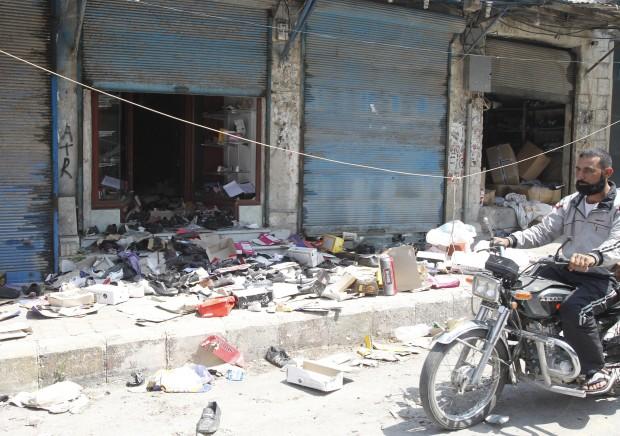Syrian Alawite Defector in Limbo
A man rides a motorcycle past storefronts abandoned due to the unrest in Haffeh town near Latakia city June 14, 2012. The Syrian town of Haffeh was smouldering and nearly deserted on Thursday after days of clashes between government forces and rebels, while activists reported more army assaults on pro-opposition areas across the country. REUTERS/Khaled al-Hariri (SYRIA – Tags: POLITICS CIVIL UNREST CONFLICT)
The violence in Syria is increasingly recognized as a civil war along sectarian lines. The country’s majority Sunni Muslim population say they are trying to restore the balance after a four-decade rule by the President Bashar al-Assad’s minority Alawite family. But for some Syrians, the battle lines are less defined.
In a crowded café in the Turkish city of Antakya, Omar phones his brother in Syria to see if anything has changed in their family’s situation. Omar can only speak to his brother in hushed tones and code words.
“They are under the eyes of the regime because of me,” he said. “Every move, they are watching my family, every move, every step.”
Omar, who asked that we not use his real name to protect his family, is an Alawite Syrian from a village outside Latakia in the northwest. The area is well known as a bastion of support for President Bashar al-Assad, who largely draws from the Alawite community for his security forces and inner circle.
As an Alawite, Omar would be considered a natural supporter of Assad’s regime. But about seven months ago, Omar fled Syria and joined the rebels, making his way to Turkey. He said he felt his community had been taken hostage, forced to support Assad against the rest of their countrymen.
“They just kidnapped the Alawite community, and they are pushing them to fight this civil war,” Omar said.
He acknowledges that his case is unusual. Only a handful of Alawites openly support the rebellion. He’s paid a price for his support. His Alawite community now shuns him, but so do some of the rebels who say they can never fully trust him.
Even before he formally defected by dodging his responsibility to the Syrian army and fleeing Syria, he felt pressed by both sides. He said when he took part in an anti-Assad protest in Latakia last year, he felt he had to cover his face.
“I was covering my face with a black cotton mask so the government could not recognize me, but also so the young people protesting would not recognize me as an Alawite guy,” he said. “You must be careful from the both sides.”
Omar shows me a video that’s been making the rounds among the mostly Sunni rebels. It shows a group of Alawites in a village outside Latakia holding posters of Assad that they kiss and embrace. The crowd chants a popular slogan, pledging to protect Assad with their “blood and souls.”
Videos like these are misleading, according to Omar, because many Alawites have no choice but to publicly announce their devotion to Assad. They’re under constant scrutiny.
“In the Sunni community, if in every building there is an agent for the regime, in an Alawite community, in every building there are five,” Omar said. “The regime knows that if the Alawite community goes into the street and protests against them, they would fall in two minutes. So that is why they’re watching every Alawite guy.”
That watchfulness, said Omar, is part of what keeps his family and other Alawites under Assad’s control.
Last week, Omar’s brother got called up to serve in the Syrian army, and he phoned Omar in distress. He doesn’t want to join the fight against the rebels, said Omar, but he’s afraid to defect.
“They cannot just leave Syria for the unknown, because they know I suffered a lot in the last seven months. No one supported me, no one helped me.”
Omar said there are also fears the family left behind in Syria would be punished as an example. When he defected, his family received daily threatening visits from police and security agents.
Omar’s been trying to call his brother for days. He’s still not sure what his brother will do. Omar has to rely on infrequent and likely monitored phone conversations to talk about matters that could mean life and death. Each day, he said, he loses a bit more hope.
Once he thought of the rebellion against Assad as a united uprising against a dictator.
“It’s not a matter of Sunni or Alawite; It’s a matter of whether you are with the regime or not.”
But today, he said, he’s afraid the sectarian divides will drag Syria into a war they’ll be fighting for years to come.
